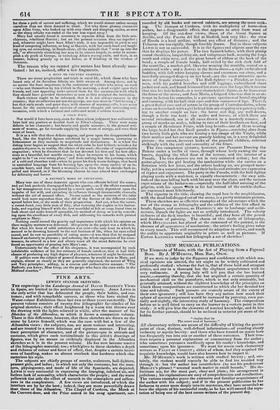NEW MUSICAL PUBLICATIONS.
The Elements of Music, with the Art of Playing from a Figured' Bass. By J. WPMURDIE, Mus. Bac., Oxon.
If we were to judge by the flippancy and confidence with which mu- sical opinions are uttered, the art ought to be widely cultivated and profoundly studied : whereas the fact is, that of these bold and arrogant critics, not one in a thousand has the slightest acquaintance with its very rudiments. A young lady will tell you that she has learned music,—meaning thereby, that she has acquired a certain quantity of mechanical skill on the pianoforte, which is not only attainable, but generally attained, without the slightest knowledge of the principles on which those compositions are constructed to which she has devoted her time and talents. Such persons are scarcely aware of the extent of their own ignorance ; still less have they any notion how much their sphere of musical enjoyment would be increased by pursuing, even par- tially and slightly, the interesting study of harmony. The compendium before us is well fitted to carry on the learner to a certain point in this study : it will give him the elements of musical knowledge, and fit him. for its further pursuit, should he be inclined to untwist yet more of the hidden
"chains that tie The secret soul or harmony."
All elementary writers are aware of the difficulty of hitting the precise point of clear, distinct, well-defined information—of avoiding cloudy verbosity or mystic brevity: and those who have treated on music have too frequently run into one or another of these extremes. Their trea- tises require a personal explanation or commentary from the author; who sometimes presumes needlessly upon his reader's knowledge, and sometimes upon his ignorance. We want for music such elementary writers as PALEY or COBBETT; either of whom, had they acquired the requisite knowledge, would have also known how to impart it. Mr. M'MVRDIE's work is written with studied brevity ; and, cer- tainly, the student would scarcely be able to find his unaided way through it : but the author has nevertheless (to use his predecessor MORLEY'S phrase) " wrested much matter in small bounds." His de- finitions are, for the most part, clear and plain ; his arrangement is judicious ; his explanations are easy of comprehension and recollection. The various examples prove the extensive and familiar acquaintance of the author with his subject ; and if in the present publication he has forborne to enter more deeply into its mysteries, they have nevertheless been the objects of his successful study, as he has well earned the repu- tation of being one of the best canon-writers of the present day.


























 Previous page
Previous page